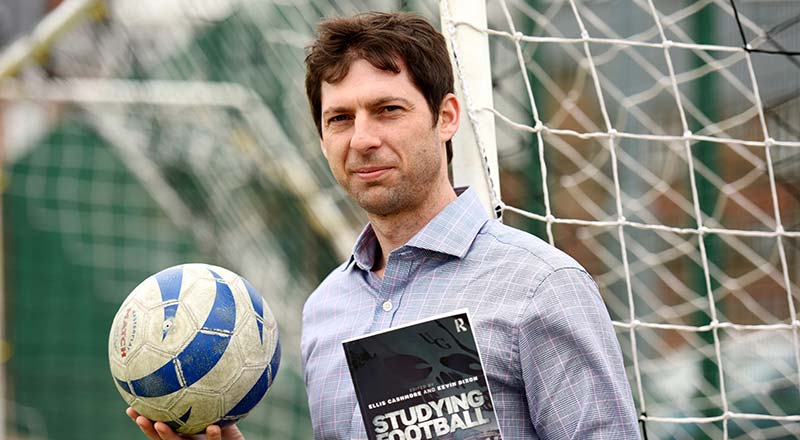Researchers put English football years ahead of Europe
English football is light years ahead of Europe when it comes to tackling fan violence, according to new research published this week by Teesside University.

Dr Kevin Dixon, of Teesside University, who carried out the study with Professor Ellis Cashmore, suggests continental Europe is well behind its English counterpart and at the stage where English football was in the 1970s and 1980s.
Their research, ‘Why football violence made a comeback in continental Europe but spared England’, has been published in the Soccer & Society journal.
The study shows how a breakdown of ideas relating to “toxic masculinity” and the emergence of positive role models, such as David Beckham, helped to create a shift in England in recent decades, in stark contrast to Europe where there continues to be a surge in football violence.
Dr Dixon and Professor Cashmore identify key developments which helped English football to shed undesirable elements related to hooliganism and violence.
A major change concerned masculinity. Prior to the 1990s, football was associated with old fashioned attitudes and behaviours, consistent with the aggression of football crowds.
Professor Cashmore said that this disappeared from English football about the time of David Beckham’s rise.
He said: “Beckham personified a new type of maleness. He was well-groomed and conscientious about his appearance.
“Combined with the rise of women’s football, the new masculinities decisively put an end to the snarling masculinity that had fueled violence.”
Other contributory factors were the introduction of all-seater family friendly stadiums, a softening in policing methods and an emergence of ‘self-policing’, with fans now more likely to report violators.
Dr Dixon added: “The code of silence among fans that once allowed aggression, racism and homophobic and misogynistic abuse to go unreported has been broken, and fans are now prepared to inform authorities when they hear or witness this kind of behaviour. Fans have effectively become self-policing.”
Fans have effectively become self-policing.
In contrast, there has been a rise in football-related violence across Europe in recent years, including attacks on team coaches, officials and fans. A recent incident saw eleven German football fans arrested in Naples after violence on the eve of the Champions League match between Napoli and Union Berlin in Naples.
A month before, Lyon's Ligue 1 match at Marseille was abandoned after the team's bus was attacked and Lyon’s manager was taken to the hospital for medical treatment. Earlier in 2023, five Napoli and three Eintracht Frankfurt fans were arrested after violent clashes erupted in Naples ahead of a Champions’ League game.
“Football in continental Europe is about where England was 50 years ago,” said Professor Cashmore. “Violence is still widespread and shows no signs of cooling off.”
The researchers suggest that while English football altered its historical character and became a wholesome form of family entertainment, change continues at a slower place across Europe.
“Our methods of policing changed accordingly,” added Dr Dixon. “On the continent, the police still go in heavy.”
Two years ago, Liverpool fans in Paris were crushed in dangerous bottlenecks, tear gassed by police and attacked by local fans.
Professor Cashmore said: “Football is unique in arousing passions and thrills. The violence we used to see at every game reflected the intensity of emotions and excitement that ran through the sport. We’ve swapped this for a different, more comfortable experience.”
 Groundbreaking project to unlock nuclear energy's role in
...
Groundbreaking project to unlock nuclear energy's role in
... Start the new year by expanding your knowledge
Start the new year by expanding your knowledge  Teesside University strengthens long-standing partnership
...
Teesside University strengthens long-standing partnership
...